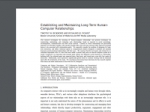
Chatbot listing, virtual agents, virtual assistants, chat bot directory, conversational agents, virtual human news, chatterbot list
NEWS: Chatbots.org survey on 3000 US and UK consumers shows it is time for chatbot integration in customer service!read more..
Long-Term Human-Computer Relationships
 This research investigates the meaning of ‘human-computer relationship’ and presents techniques for constructing, maintaining, and evaluating such relationships, based on research in social psychology, sociolinguistics, communication and other social sciences. Contexts in which relationships are particularly important are described, together with specific benefits (like trust) and task outcomes (like improved learning)
This research investigates the meaning of ‘human-computer relationship’ and presents techniques for constructing, maintaining, and evaluating such relationships, based on research in social psychology, sociolinguistics, communication and other social sciences. Contexts in which relationships are particularly important are described, together with specific benefits (like trust) and task outcomes (like improved learning) known to be associated with relationship quality. We especially consider the problem of designing for longterm interaction, and define relational agents as computational artifacts designed to establish and maintain long-term social-emotional relationships with their users. We construct the first such agent, and evaluate it in a controlled experiment with 101 users who were asked to interact daily with an exercise adoption system for a month. Compared to an equivalent task-oriented agent without any deliberate social-emotional or relationshipbuilding skills, the relational agent was respected more, liked more, and trusted more, even after four weeks of interaction. Additionally, users expressed a significantly greater desire to continue working with the relational agent after the termination of the study. We conclude by discussing future directions for this research together with ethical and other ramifications of this work for HCI designers.
New Comment
Only registered members are allowed to comment. or login
or login
